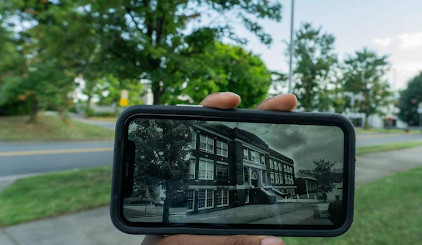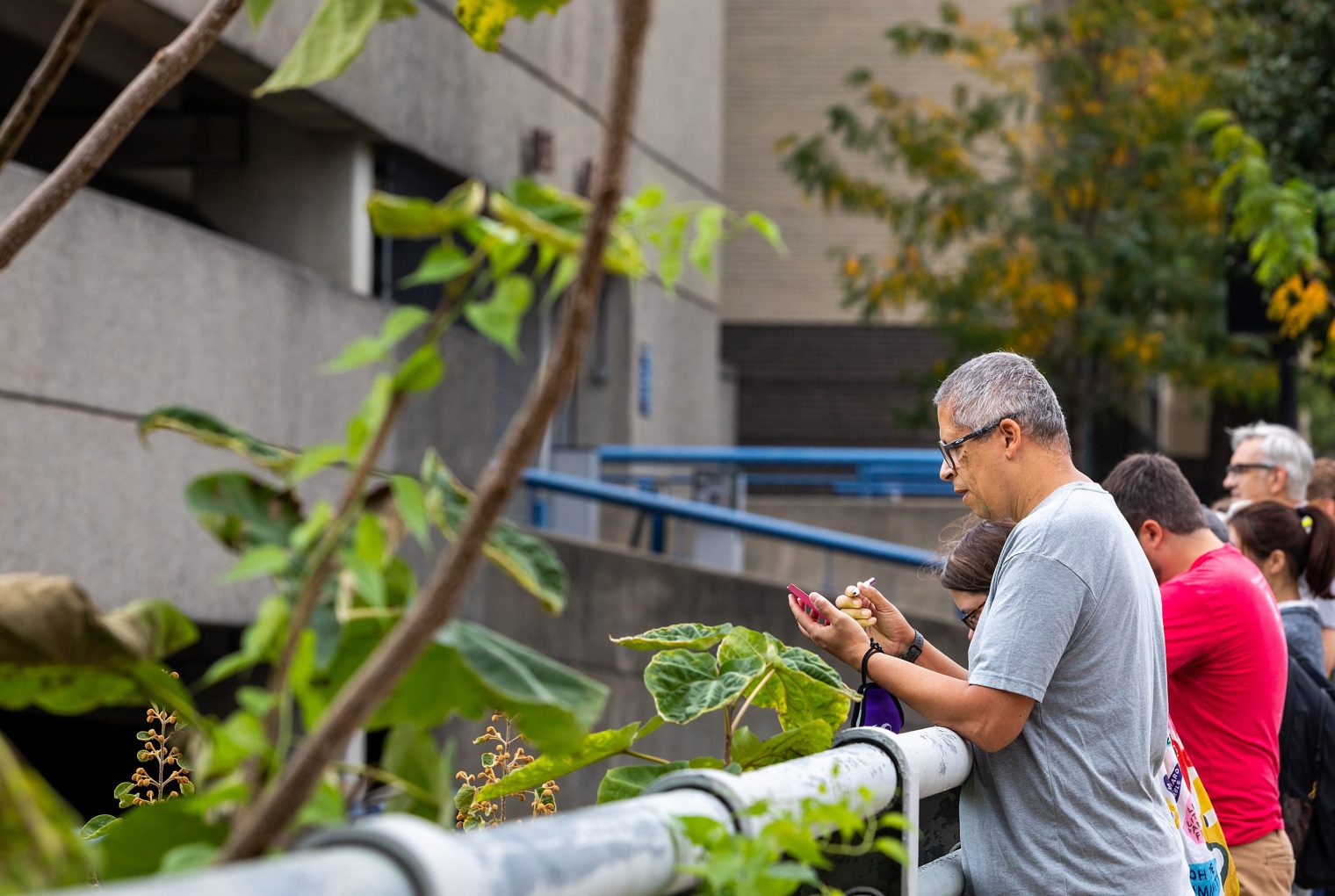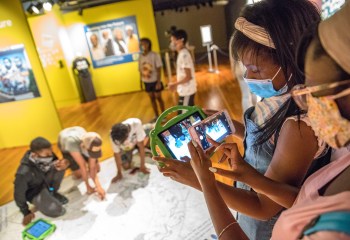Eight organizations will use technology and open data to boost community engagement and enhance public services
(March 8, 2022) – To help build more engaged communities, the John S. and James L. Knight Foundation is investing over $4 million in eight organizations that use technology and data to develop and apply smart city strategies. The investment aims to boost resident engagement and strengthen public services.
The new investments will support innovative initiatives such as: a digital dashboard that tracks the global effects of climate change and connects community leaders to discuss efficient mitigation strategies; technical assistance to Knight communities to develop plans for deploying broadband investments in underserved areas; and a multiyear initiative that will provide digital tools and training to city governments to enhance resident-government engagement.
“Whether it’s developing an efficient way to apply for business permits or helping engage residents around pressing issues like climate change, we know that technology and data play essential roles in improving civic participation and government services,” said Lilian Coral, Knight’s director for national strategy and technology innovation. “Knight supports these organizations and their innovative solutions to ensure the efficiency of public services and the empowerment of residents in community development.”
Here’s a closer look at the organizations and their projects that are receiving Knight support:
- Centre for Public Impact North America (CPI) and Beeck Center for Social Impact & Innovation ($3.3M)) – To support CPI and Beeck in launching The Opportunity Project for Cities, a three-year program in four cities that brings together city governments, technologists and community partners to leverage open data to help local governments develop technology-based solutions for community needs. The program will digitally transform city halls by providing coaching and training to government staff to develop digital services with better design, community-based research, data stewardship, product management and sustainability planning. The two organizations launched an open call to select the four cities to participate in the program. To learn more and apply, click here.
- Georgetown University – Beeck Center for Social Impact and Innovation ($250K) – To establish a national network of experts to provide guidance to civic technology leaders in Knight cities (including Detroit, Charlotte, San Jose and Philadelphia) and other local governments on how best to leverage American Rescue Plan Act (ARPA) funding to improve government services through technology. The Beeck Center will convene a series of workshops, publish a website and release a report that provides best practices, roadmaps and recommendations in investing ARPA funds to enhance digital infrastructure to ensure greater impact for taxpayers and residents in cities.
- US Ignite ($214K) – To identify ARPA funding opportunities that support local broadband deployments for 10 Knight communities. The initiative will assess community networking options in underserved neighborhoods and will educate residents on sustainable broadband business models to ensure successful and sustainable long-term operations.
- Earth HQ via Rockefeller Philanthropy Advisors ($195K) – To support the Earth Dashboard, the first public facing virtual Earth portal integrating extreme event data with daily narrative reporting from Mongabay, the largest network of environmental science journalists. The Earth Dashboard will also highlight actions currently being undertaken by businesses, local and federal governments and citizens to mitigate the effects of climate change.
- Harvard University ($150K)) – To create the Network for Digital Infrastructure Optimization within the Harvard Kennedy School of Government’s Innovation in American Government Program. The digital hub will compile best practices, insights and replicable innovations to inform local leaders in Knight cities and beyond on how to use digital infrastructure to expand community involvement and improve government services such as mobility and public health. The set of best practices will be published in a report and several blog pieces that will be distributed to state and local officials. The initiative will also include a convening for U.S. public officials to discuss the data and impact.
- The Foundation of the University of North Carolina at Charlotte ($150K) – To expand the Institute for Social Capital’s integrated data system, which collects and manages Charlotte-Mecklenburg’s health, human services, education, housing and workforce data. The data system fosters civic engagement and collaboration across public, private sector and community stakeholders to understand local challenges and drive cross-sector solutions.
- Avenue North Renaissance ($123K) – To develop The Lights of North Broad AR, an augmented reality platform that shares the history of Philadelphia’s North Broad neighborhood with residents. This application will also promote local businesses and help engage stakeholders to help inform community revitalization efforts.
- Coding it Forward ($100K) – To support the Civic Innovation Corps, a 10-week internship program for early-career software engineers, data scientists, product managers and designers to solve innovation challenges in local and state governments across the country. The program will help Knight communities increase technical capacity in their public service workforces and implement new opportunities that boost resident engagement..
This latest investment is part of Knight’s Smart Cities program, which has invested $37.5 million to date to support stronger, more engaged communities by enabling the voice of the community to be reflected in the design and use of technology.
“We are honored to have Knight Foundation’s support to expand The Opportunity Project for Cities,” said Dan Vogel, North America Director of the Centre for Public Impact. “In its first iteration, we saw the good that city governments, community members and tech partners can do when working together to address pressing challenges with local data. The Project challenges participants to talk with residents that they may not have engaged historically, to leverage the available city data that they may not have used before, and to rethink how technology can serve the community. We are excited to bring this project to more cities, supporting local governments to change the way they work with people and change residents’ lives for the better.”
“We are interested in understanding how technology can improve the quality of life in American cities, then identifying best practices and providing a path to implementing those lessons,” said Stephen Goldsmith, director of the Data Smart Cities Program at Harvard University’s Kennedy School of Government. “With this new support from Knight, we’ll be able to look at how digital infrastructure can play a critical role in helping government and local entities to better understand and hear the needs of communities, ranging from mobility to public health needs.”
“The Lights of North Broad AR is an interactive experience that will broadcast the vibrant developments and the storied history along the North Broad corridor in Philadelphia,” said Shalimar Thomas, executive director of the North Broad Renaissance. “This investment is the first step to help us engage community members and visitors by taking them on a journey through the past, present and future, using the North Poles as a guiding line to give voice to the evolving narrative that is North Broad.”
###
About the John S. and James L. Knight Foundation
As social investors, the Knight Foundation supports democracy by funding free expression and journalism, arts and culture in community, research in areas of media and democracy, and in the success of American cities and towns where the Knight brothers once published newspapers. Learn more at kf.org and follow @knightfdn on social media.




